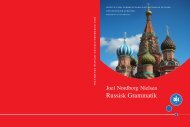[hprints-00683151, v2] Enea Silvio Piccolomini (Pius II ... - Hprints.org
[hprints-00683151, v2] Enea Silvio Piccolomini (Pius II ... - Hprints.org
[hprints-00683151, v2] Enea Silvio Piccolomini (Pius II ... - Hprints.org
You also want an ePaper? Increase the reach of your titles
YUMPU automatically turns print PDFs into web optimized ePapers that Google loves.
<strong>hprints</strong>-<strong>00683151</strong>, version 2 - 19 Mar 2013<br />
time it was readressed to various popes, also to <strong>Pius</strong> <strong>II</strong>, and it was often published<br />
together with that pope’s letter to Mehmed <strong>II</strong> as a reply of the sultan to the pope. 58<br />
The letter implies that the Turks descend from the Trojans, and the pasha vows to<br />
avenge the fall of Troy by attacking the Greeks who had conquered Troy.<br />
The notion of the Turks descending from the Trojans was probably known to<br />
Coluccio Salutati, who was the first to apply the name Teucri (used by Virgil for the<br />
Trojans) to the Turks. However, he did not himself state directly that the Turks<br />
descended from the Trojans. 59<br />
However, that idea – as based on the false etymological approximation of Teucri<br />
(Troians) and Turci/Turcae (Turks) - spread to the Renaissance humanists who<br />
debated it hotly. It did not take long before the idea was rejected, and other<br />
forefathers of the Turks were found to be more likely, e.g. the ancient Scythians,<br />
though that theory was also false. The Trojan origins of the Turks nonetheless<br />
resurfaced from time to time 60 , e.g. in the poem Amyris by Giovanni Mario Filelfo,<br />
the son of Francesco 61 .<br />
One of the most influential debaters of the origins of the Turks was our <strong>Piccolomini</strong>,<br />
who quite emphatically rejected the Trojan descendance of the Turks and<br />
propagated the theory of their descendance from the Schythians 62 . According to<br />
Meserve, <strong>Piccolomini</strong> was “the most important – certainly the most frequent – critic<br />
of the idea” of the Trojans as forefathers of the Turks. 63 And Schwoebel writes that<br />
“<strong>Pius</strong> had no time for the theories about the Turks avenging their ancestors or<br />
occupying a rightful inheritance”. 64 Hankins even states that the theme recurred so<br />
often in <strong>Pius</strong>’ writings that it amounted to an obsession. 65 His reasoning was based<br />
on his reading of classical authors which certainly did not support the Trojan thesis,<br />
but otherwise his theory of their descendance from the Scythians was to a great<br />
58 Meserve: Empire, pp. 35-37<br />
59 Meserve: Empire, pp. 26-27; Hankins, p. 136<br />
60 Spencer; Schwoebel, pp. 31-32, 148, 188-189, 204-205; Bisaha, p. 89-90<br />
61 Schwoebel, pp. 148-149; Bisaha, pp. 89; Meserve: Empire, p. 41-43<br />
62 Bisaha, pp. 75-76; Helmrath: <strong>Pius</strong>, pp. 106-111; Meserve: Medieval, pp. 419-425<br />
63 Meserve: Empire, p. 22<br />
64 Schwoebel, p. 70-71<br />
65 Hankins, p. 140<br />
27


![[hprints-00683151, v2] Enea Silvio Piccolomini (Pius II ... - Hprints.org](https://img.yumpu.com/16048892/27/500x640/hprints-00683151-v2-enea-silvio-piccolomini-pius-ii-hprintsorg.jpg)
![[hprints-00284881, v1] Musik i gymnasiet](https://img.yumpu.com/17715560/1/190x245/hprints-00284881-v1-musik-i-gymnasiet.jpg?quality=85)

